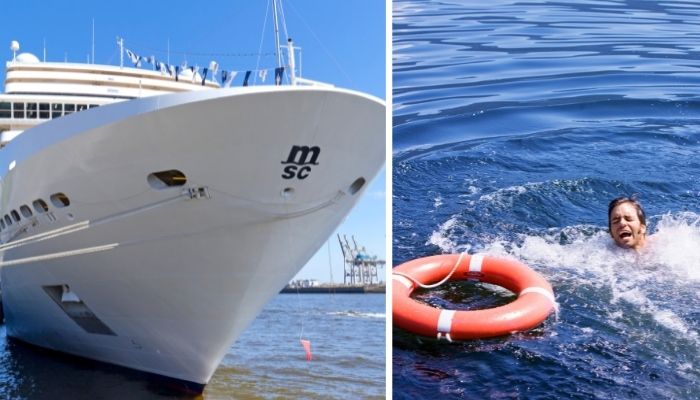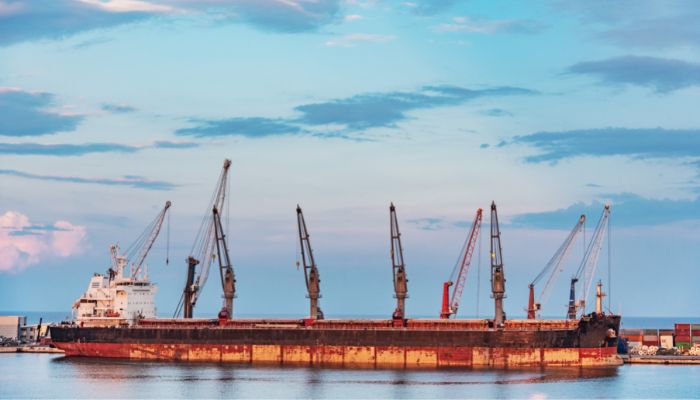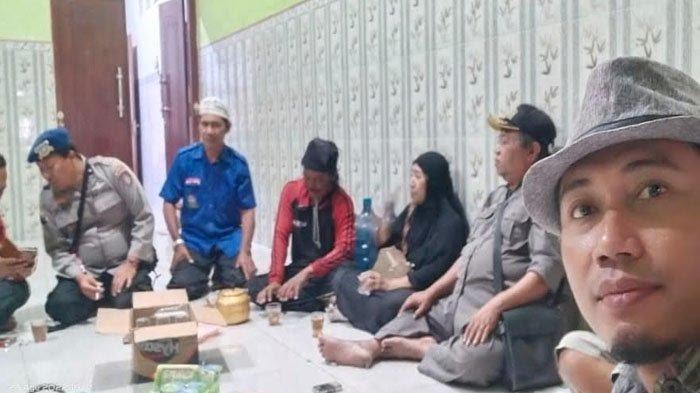With some shipping now on the move again out of Ukraine, the northern Black Sea has been designated a Warlike Operations Area for merchant vessels. Sarah Robinson looks at what this means for seafarer safety and how trade unions are involved in providing protection for their members
When people embark on a career in the Merchant Navy, they’re probably not expecting to see military action, but this in fact a persistent safety problem for civilian seafarers around the world.
We might think of the cargoships in the Second World War supply convoys, or the ferries and cruiseships requisitioned as troop carriers (with their usual crews) for the Falklands conflict.
But many Merchant Navy seafarers who find themselves in danger from conflict aren’t engaged in official ‘war work’, but find themselves in a dangerous situation as they go about their usual activities. For example, in the Telegraph we have told the stories of Nautilus International members whose civilian tankers came under fire in the Persian/Arabian Gulf during the Iran-Iraq war, and others whose vessels became marooned in the Great Bitter Lake off the Suez Canal as a result of the Six-Day War.
Ukraine: the latest maritime war zone
This year, Merchant Navy seafarers from all over the world have been asked to go through a war zone on an urgent humanitarian mission to bring crops out of Ukraine and on to the countries who rely on this food, which includes wheat, other cereals, and sunflower seeds for cooking oil.
Famously known as ‘the breadbasket of Europe’, Ukraine under normal circumstances is one of the top three grain exporters in the world, but since the Russian invasion in February 2022 has struggled to get its harvests out of mined and blockaded Black Sea ports.
Hopes were not high that this problem would be overcome, but after many false dawns, the involvement of Turkey eventually brought both Ukraine and Russia to the table in Istanbul to sign a United Nations agreement on 27 July – establishing the Black Sea Grain Initiative.
Aiming to keep seafarers safe
The Black Sea Grain Initiative specifically allows for significant volumes of commercial food exports from three key Ukrainian ports in the Black Sea: Odesa, Chornomorsk and Yuzhny. Ukrainian vessels guide the cargoships into the international waters of the Black Sea, avoiding mined areas. The vessels then proceed towards the Bosphorus Strait along an agreed corridor. Both the Russian and Ukrainian sides have agreed to withhold attacks on any of the commercial vessels or ports engaged in the initiative to transport vital grain.
For the merchant seafarers on the cargoships, their safety is in the hands of a new UN Joint Coordination Centre, which monitors implementation of the 27 July agreement. It is hosted in Istanbul and includes representatives from Ukraine, Russia and Turkey.
Ships heading to and from the Ukrainian ports are being inspected by teams organised by the Joint Coordination Centre to ensure they are only carrying the agreed food cargoes and not soldiers, weapons or ammunition.
Who are the Merchant Navy seafarers on the grain ships?
Initial reports suggested that maritime employers were struggling to find crew members willing to take part in the Black Sea Grain Initiative, and until recently Ukrainian nationals were not usually allowed to leave the country because of military conscription. However, permission has now been given for Ukrainian seafarers to travel for work, and recruitment from other nations seems to have improved, judging by the daily shipping movements being reported by the UN Joint Coordination Centre.
Inevitably for the shipping industry, some of these vessels will be crewed by seafarers from developing countries who are not in a financial position to turn down work and are not supported by a trade union.
However, the International Transport Workers’ Federation (ITF) – of which Nautilus is an affiliate – has ensured that some 9,500 vessels and 170,000 seafarers worldwide are covered by Warlike Operations Area agreements instigated by unions. These are either national agreements (of which more below) or international agreements negotiated between the ITF and shipowners at the International Bargaining Forum (IBF).
‘While specific terms of each agreement differ depending on the nature of the risk involved, in general they allow for seafarers to disembark before a vessel enters the affected area,’ says Nautilus head of professional and technical David Appleton. ‘They may also place obligations on companies to underwrite any insurance policies that may be rendered invalid by entering into the area and, in certain instances, agree additional payments for seafarers whilst they are in the area.’
Nautilus general secretary Mark Dickinson has been regularly involved with negotiations at the IBF, where Warlike Operations Area agreements for the Northern Black Sea Region, the Sea of Azov and All Ports in Ukraine were added in March 2022.
He stresses how important it is that seafarers around the world join a union, particularly one affiliated with the ITF: ‘This is a powerful example of how unions work together internationally to secure protection for their members and help seafarers globally, and we will continue to be part of the movement to uplift everyone in the industry to decent and safe work onboard.’
Enhanced war zone protection for Nautilus members
Nautilus members in the UK and Netherlands are covered by national warlike operations agreements that go beyond the IBF terms.
In the UK, the process of drafting and renewing agreements is done through the Warlike Operations Area Committee (WOAC), at which terms are agreed directly between the maritime unions Nautilus and RMT and the UK Chamber of Shipping. There is a similar process in the Netherlands where Nautilus negotiates agreements with the Dutch shipowner bodies VWH, NEMEA, Neptune and Spliethoff.
The UK WOAC agreement for Ukraine applies to all vessels operated by companies in membership of the UK Chamber of Shipping. It expands on the IBF minimum in a number of ways – for example, by declaring a broader Warlike Operations Area that covers ‘all Ukrainian, Russian and International Waters north of 44°North in the Black Sea.’
The Netherlands war zone agreement for Ukraine applies to Dutch-flagged vessels and is broadly equivalent to the UK WOAC agreement.
‘Both the British and Dutch agreements reflect the importance of regular dialogue between unions and employers,’ says Mr Appleton. ‘We are not currently aware of any Nautilus members on vessels involved in the Black Sea Grain Initiative, but members with any concerns about operating in a warlike or high risk area should contact us and we will be able to advise them of their rights, whether those fall under the national agreements in the UK and Netherlands or they relate to the IBF agreement.’
Source: https://www.nautilusint.org/en/news-insight/telegraph/working-in-a-war-zone-how-national-and-international-warlike-operations-area-agreements-protect-merchant-navy-seafarers/














